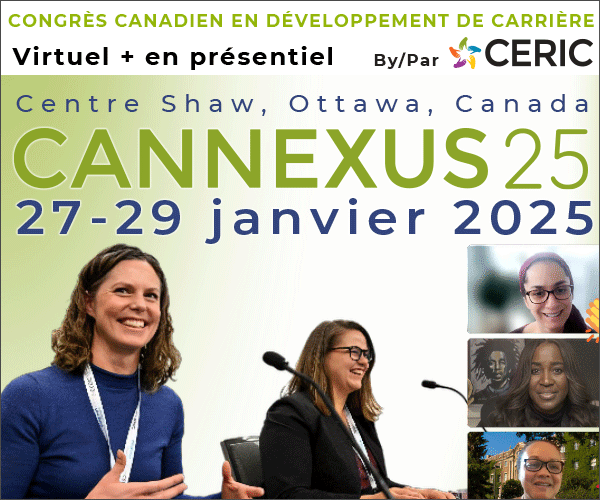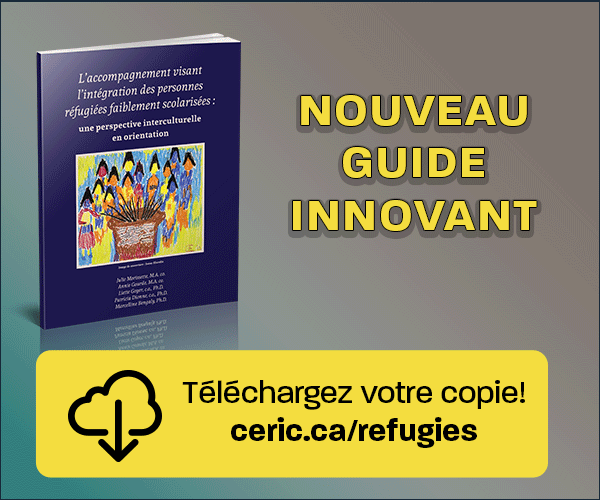La professionnalisation du secteur canadien du développement de carrière : Une analyse rétrospective
DOI :
https://doi.org/10.53379/cjcd.2024.385Mots-clés :
professionnel, développement de carrière, cadre de compétences, la théorie des systèmes écologiques, leadershipRésumé
Le secteur canadien du développement de carrière travaille depuis des décennies à l'amélioration de la professionnalisation des professionnels du développement de carrière, avec des projets tels que les normes et lignes directrices originales (S&G) lancées en 2001. Cependant, pour refléter et guider la pratique actuelle, des mises à jour approfondies et une nouvelle approche étaient nécessaires. Grâce à la recherche, à la consultation, au développement et à la validation, le Cadre de compétences pancanadien pour les professionnels en développement de carrière, le Profil national de compétences pour les professionnels en développement de carrière et le Code d'éthique pour les professionnels en développement de carrière ont été créés. En examinant le processus de ce projet global, la théorie des systèmes écologiques de Bronfenbrenner (1979) offre un cadre conceptuel pour comprendre les systèmes interconnectés complexes qui ont un impact sur le secteur. Ensuite, les cinq pratiques exemplaires de leadership de Kouzes et Posner (2003, 2012) sont appliquées pour explorer les actions et les comportements qui ont créé des espaces utiles où les praticiens, les experts en la matière et les théoriciens ont pu collectivement et authentiquement travailler ensemble pour accomplir des tâches extraordinaires.
Références
ASPECT BC. (2022). Refocusing the urban lens for rural and remote employment services. https://www.aspect.bc.ca/resources/Documents/Sector%20Reports/ASPECT%20BC%20Refocusing%20the%20Urban%20Lens.pdf
Bronfenbrenner, U. (1979). The ecology of human development: Experiments by nature and design. Harvard University Press.
Cameron, K. S., Dutton, J. E., & Quinn, R. E. (2003). Positive organizational scholarship: Foundations of a new discipline. Berrett-Koehler. ISBN 1576752321
CCDF. (n.d.). History [unpublished document].
CCDF. (2001). Canadian standards & guidelines for career development practitioners.
CCDF. (2004). Code of ethics for career development practitioners.
CCDF. (2009). Pan-Canadian mapping study of the career development sector. https://ccdf.ca/wp-content/uploads/2019/02/PAN-CANADIAN-MAPPING-STUDY-OF-THE-CAREER-DEVELOPMENT-SECTOR.pdf
CCDF. (2021a). Code of ethics for career development professionals. https://ccdp-pcdc.ca/en/pdf/Code_of_Ethics_2021_EN.pdf
CCDF. (2021b). Final report: Supporting Canadians to navigate learning and work. [unpublished document]
CCDF. (2021c). Pan-Canadian competency framework for career development professionals. https://ccdp-pcdc.ca/en/cdp-competency-framework
CERIC. (2019a). 2019 Survey of career service professionals. https://ceric.ca/2019-survey-of-career-service-professionals
CERIC. (2019b). Growing the big tent: CERIC’s 2019 annual report. https://ceric.ca/2020/07/growing-the-big-tent-cerics-2019-annual-report
Chueng, C. M. K., & Lee, M. K. O. (2007). Understanding user intention to continue sharing knowledge in virtual communities. Proceedings of the 15th European Conference on Information Systems, St. Gallen, June 7-9. https://scholars.cityu.edu.hk/en/publications/publication(8b154325-afcd-4a2e-bf74-8eed7512ae64).html
ESDC, 2021. Employment and Social Development Canada - Departmental plan for 2021 to 2022. https://www.canada.ca/en/employment-social-development/corporate/reports/departmental-plan/2021-2022.html
Fan, H. L., Chang, P. F., Albanese, D., Wu, M. J., & Chuang, H. J. (2016). Multilevel influences of transactive memory systems on individual innovative behaviour and team innovation. Thinking Skills and Creativity, 19(3), 49-59. http://dx.doi.org/10.1016/j.tsc.2015.11.001
Hashim, K.F., & Tan, F.B. (2015). The mediating role of trust and commitment on members’ continuous knowledge sharing intention: A commitment-trust theory perspective. International Journal of Information Management, 35(2), 145-151. https://doi.org/10.1016/j.ijinfomgt.2014.11.001
Honkaniemi, L., Lehtonen, M. H., & Hasu, M. (2015). Well-being and innovativeness: Motivational trigger points for mutual enhancement. European Journal of Training and Development, 39(5), 393-408. https://doi.org/10.1108/EJTD-11-2014-0078
Knoke, D., & Wood, J. R. (1981). Organized for action: Commitment in voluntary organizations. Rutgers University Press. ISBN 0-8135-0911-4
Kouzes, J. M., & Posner, B. Z. (2003). Encouraging the heart: A leader’s guide to rewarding and recognizing others. Jossey-Bass. ISBN-10 0787964638
Kouzes, J. M., & Posner, B. Z. (2017). The leadership challenge: How to get extraordinary things done in organizations (6th ed.). Jossey-Bass. ISBN-10 1119278961
Kouzes, J. M., & Posner, B. Z. (2021). Everyday people, extraordinary leadership: How to make a difference regardless of your title, role, or authority. John Wiley & Sons, Inc. ISBN 98711186972 (epub).
Kouzes, J. M., & Posner, B. Z. (2023). The leadership challenge: How to make extraordinary things happen in organizations. John Wiley & Sons, Inc. ISBN. 9781119736158 (epub).
Koveshnikov, A., Wechtler, H., & Dejoux, C. (2014). Cross-cultural adjustment of expatriates: The role of emotional intelligence and gender. Journal of Word Business, 49(3), 362-371. https://doi.org/10.1016/j.jwb.2013.07.001
Kutsyuruba, B., Walker, K., & Noonan, B. (2010). The ecology of trust in the principalship. Journal of Educational Administration and Foundations, 21(1), 23-47.
Li, V., Mitchell, R., & Boyle, B. (2016). The divergent effects of transformational leadership on individual and team motivation. Group & Organization Management, 41(1), 66-97. https://doi.org/10.1177/1059601115573792
London, M. (2013). Generative team learning in web 2.0 environments. Journal of Management Development, 32(1), 73-95. https://doi.org/10.1108/ 02621711311287035
Macrotrends. (2023). Tokyo, Japan metro area population 1950-2023. https://www.macrotrends.net/cities/21671/tokyo/population
Odoardi, C., Montani, F., Boudrias, J. S., & Battistelli, A. (2015). Linking managerial practices and leadership style to innovative work behaviour. Leadership & Organization Development Journal, 36(5), 545-569. http://dx.doi.org/10.1108/LODJ-10-2013-0131
Pickerell, D. A., & Neault, R. A. (2012). Where’s the work? Helping career practitioners explore their career options. Life Strategies Ltd.
Wang, J., Yang, J., & Xue, Y. (2017). Subjective well-being, knowledge sharing and individual innovation behavior: The mediating role of absorptive capacity. Leadership & Organization Development Journal, 38(6), 1110-1127. http://dx.doi.org/10.1108/LODJ-10-2015-0235
Wu, C. H., Parker, S. K., & De Jong, J. P. J. (2011). Need for cognition as an antecedent of individual innovation behaviour. Journal of Management, 40(6), 1511-1534. https://doi.org/10.1177/0149206311429862
Worldometer. (2023). Countries in the world by population. https://www.worldometers.info/world-population/population-by-country/

Téléchargements
Publié-e
Comment citer
Numéro
Rubrique
Licence
(c) Tous droits réservés La Revue canadienne de développement de carrière 2024

Cette œuvre est sous licence Creative Commons Attribution - Pas d'Utilisation Commerciale - Pas de Modification 4.0 International.











